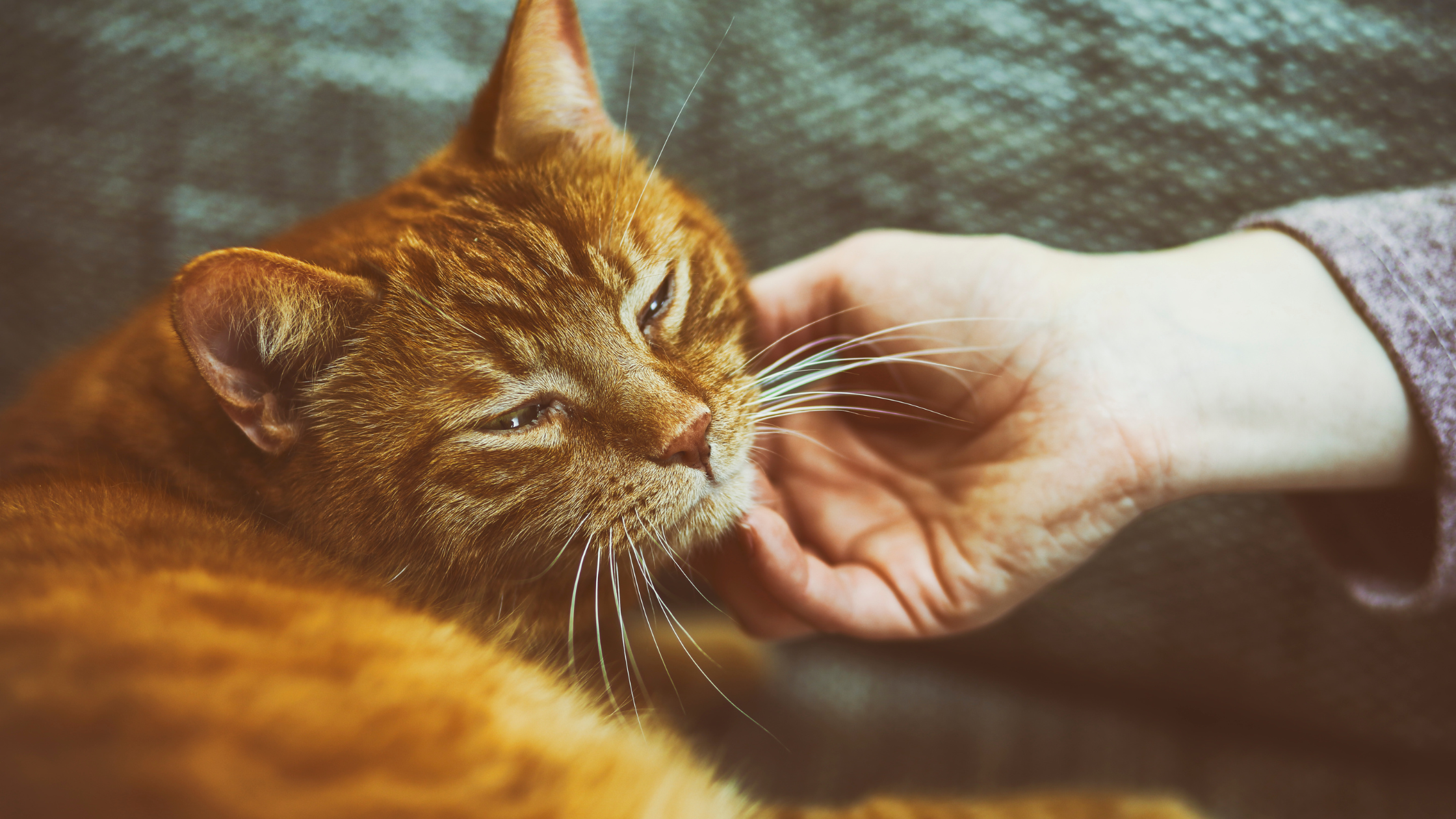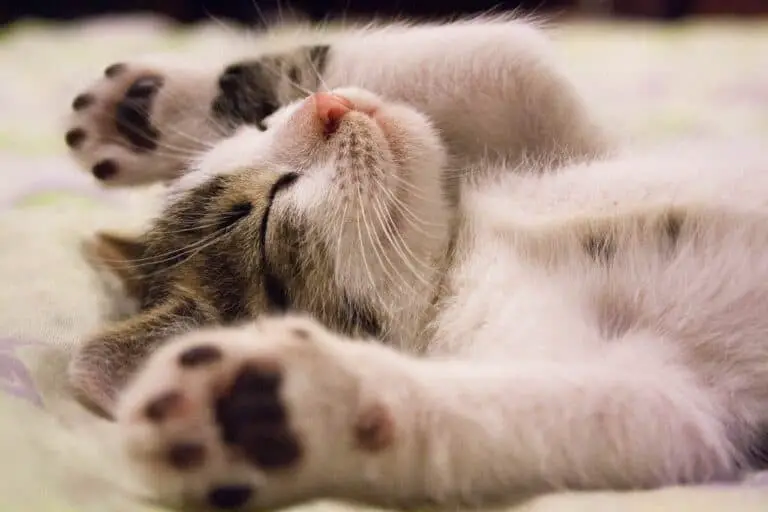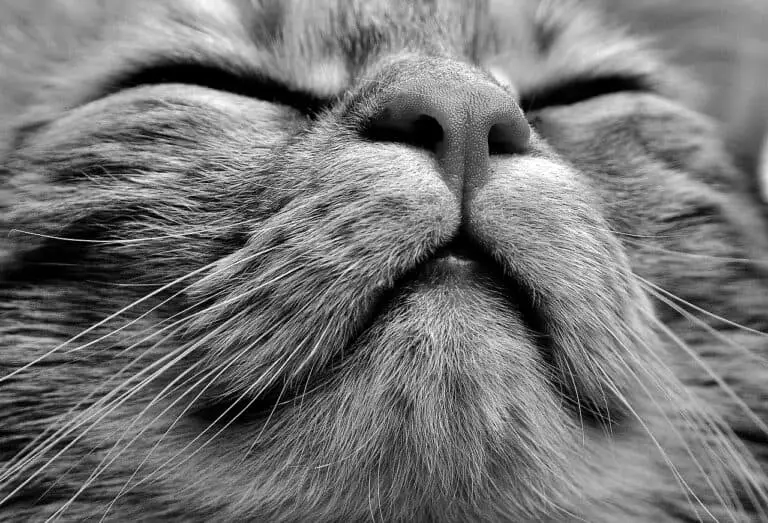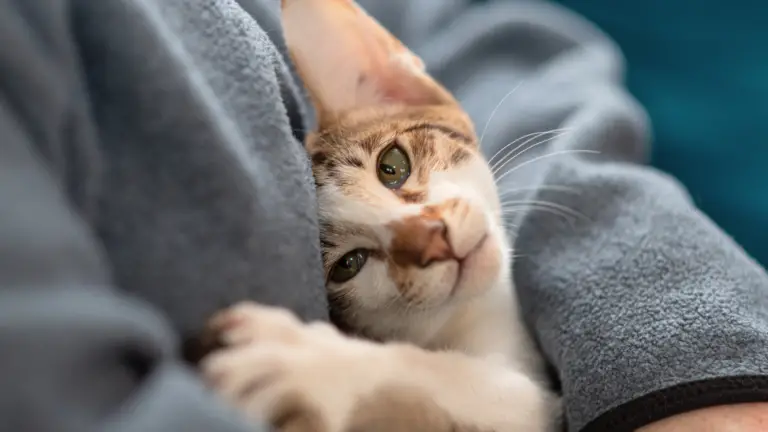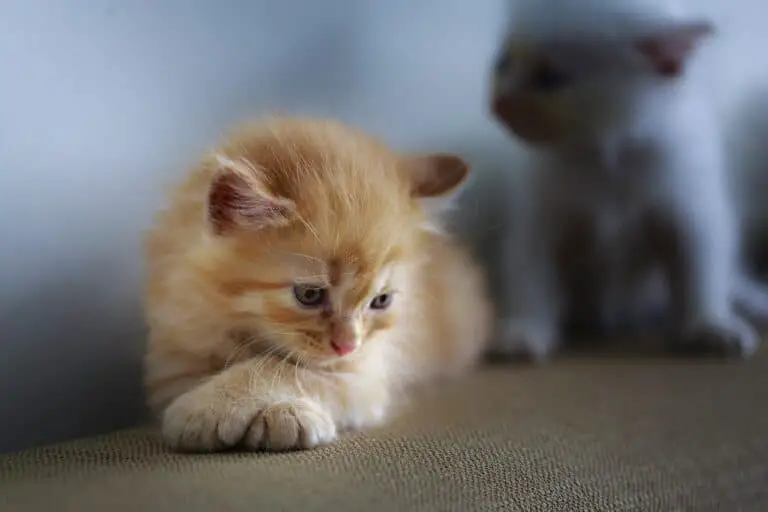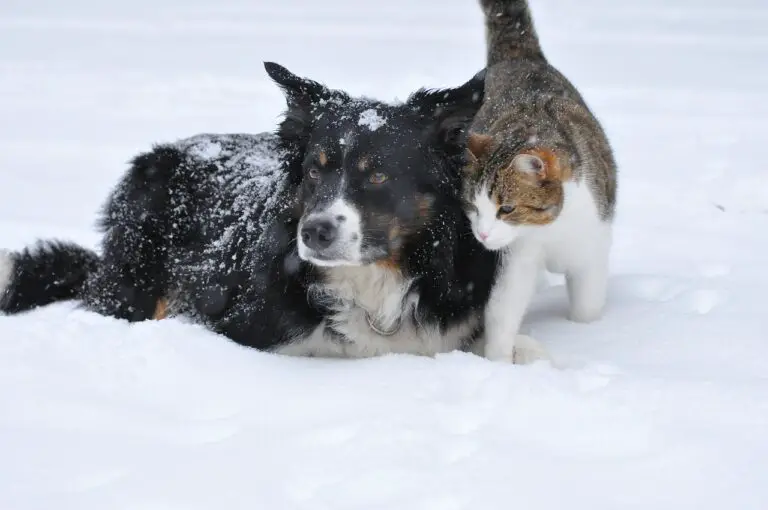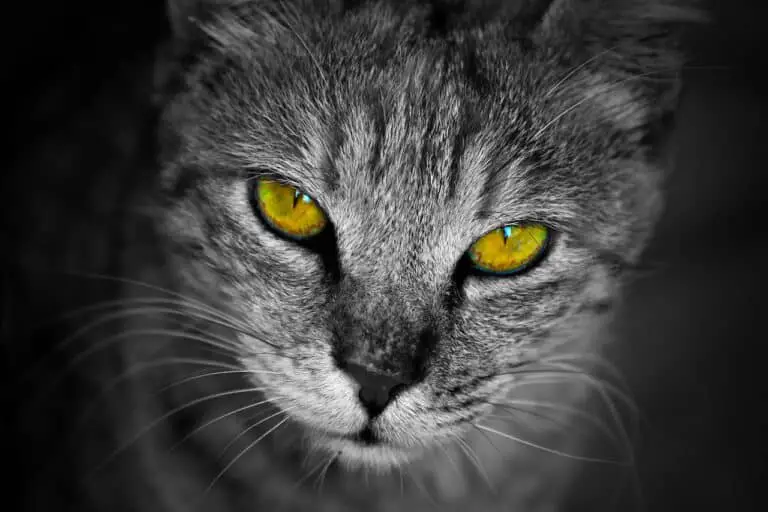WHY IS MY CAT PURRING SO LOUD? 5+ REASONS
Why is my cat purring so loud? Cats often purr when they are feeling happy and relaxed. So if your cat is sitting in your lap, getting petted, and purring loudly, likely, they are simply enjoying your company.
Cats often purr when they are feeling happy and relaxed. So if your cat is sitting in your lap, getting petted, and purring loudly, likely, they are simply enjoying your company.
But cats can purr loudly for many other reasons. So let’s see which one.
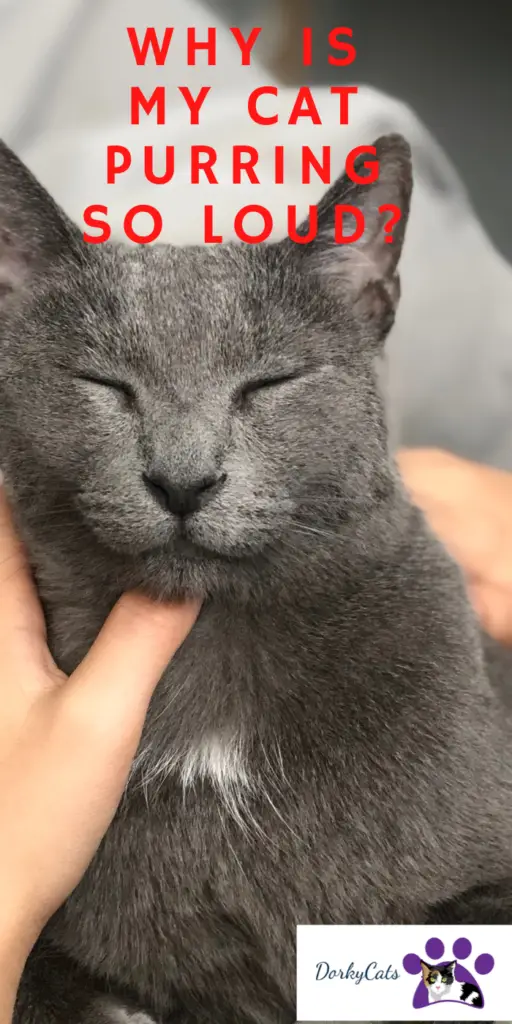
WHY IS MY CAT PURRING SO LOUD?
Cats purr for various reasons, including when they are happy, relaxed, or content. Your cat may be purring loudly because they are feeling exceptionally comfortable and happy in its current environment.
In addition to expressing contentment, cats may also purr to communicate with their owners or other cats. Purring can be a sign of affection or an attempt to solicit attention or love from their owners.
However, it’s also possible that your cat’s loud purring could indicate a health issue, such as respiratory distress or pain.
If you notice any other changes in your cat’s behavior, such as changes in appetite, activity level, or grooming habits, or if the loud purring is accompanied by other symptoms, such as coughing or wheezing, it may be a good idea to consult with a veterinarian to rule out any potential health issues.
WHAT IS PURRING IN ACTUAL FACTS?
Purring is a unique vocalization that cats produce. The exact mechanism behind purring is not fully understood, but it is thought to involve the rapid contraction and relaxation of the muscles in a cat’s larynx and diaphragm.
As a cat inhales and exhales, the muscles vibrate at a frequency of around 25 to 150 Hertz, creating the characteristic purring sound. This sound can range from a soft, low rumble to a loud, deep purr.
WITH WHAT THE VIBRATIONS OF A PURRING CAT CAN BE COMPARED TO?
The vibrations of a purring cat can be compared to a small motor or a low rumbling sound. The sound of a cat’s purr can vary depending on the individual cat, its age, and its breed. Some cats purr very quietly, while others purr loudly enough to be heard across the room.
When you touch a purring cat, you may also be able to feel the vibrations in its body. These vibrations can be quite strong, especially in larger cats.
Overall, the vibrations of a purring cat are a unique and interesting aspect of feline behavior. While the exact purpose of purring is not fully understood, it is thought to serve multiple functions, including communication, self-soothing, and healing.
WHY IS MY CAT PURRING SO LOUD AND FAST?
Cats often purr when they’re happy and relaxed. This can signify that your cat feels content and comfortable in its environment.
Purring can also signify affection and bonding between you and your cat. If your cat is purring while cuddling with you, it’s likely a sign that it feels safe and loved.
Purring can also help cats to comfort themselves when they’re in pain or discomfort. For example, if your cat is purring loudly and quickly while resting, it may be trying to soothe itself.
Cats also use purring to communicate with their owners and other cats. For example, they may purr to show that they’re happy to see you or signal other cats that they’re friendly.
Finally, some studies have suggested that the vibrations created by purring can have healing properties for cats. For example, low-frequency vibrations can stimulate bone growth, reduce pain, and improve breathing. So if your cat is purring loudly and quickly, it may be doing so to heal itself.
WHAT DOES IT IS MEANS A LOUD PURRING IN SICK CATS?
Cats often purr when they’re in pain or discomfort, as the vibrations produced by purring can help to reduce pain and promote healing.
Purring can also help cats calm down and relieve stress and anxiety, which may be especially important if the cat feels sick or unwell. When cats are sick, they may feel vulnerable and scared. Purring can be a way for them to comfort themselves and feel safe.
Cats may purr to communicate their needs to their owners. For example, if a sick cat is purring loudly, it may signal its owner that it needs help or attention.
Despite feeling sick, some cats may still purr when they’re happy and content, especially if they receive love and attention from their owners.
If your cat is sick, it’s always best to consult a veterinarian to ensure it receives proper care and treatment.
WHY IS MY CAT PURRING SO LOUD WHILE SLEEPING?
Cats often purr when they’re happy and relaxed, including when sleeping.
Purring can be a way for cats to comfort themselves and feel safe, even while sleeping. The vibrations produced by purring can be soothing for cats.
Your cat may be purring because it’s happy and content with its sleeping environment. Cats are very particular about where they sleep, and if your cat is purring while sleeping, it may be a sign that it feels comfortable and secure in its surroundings.
If your cat is sleeping near you and purring loudly, it may be a sign that it’s bonding with you. Cats often purr when they’re close to their owners to show affection and establish a sense of trust and security.
If your cat is purring while sleeping, it may be doing so to promote healing and reduce pain or discomfort.
Overall, purring is generally a positive sign in cats, indicating they’re relaxed and content. If your cat is purring loudly while sleeping, it’s likely just enjoying a peaceful slumber.
OLD CAT IS PURRING VERY LOUDLY – WHY?
An old cat purring very loudly could be due to several reasons, including happiness and contentment. Cats often purr when they’re happy and relaxed, including older cats. So if your cat is purring loudly, it may be a sign that it’s feeling content and comfortable in its environment.
The vibrations produced by purring can help to reduce pain and promote healing in cats. So if your older cat is purring loudly, it may be doing so to alleviate any pain or discomfort it’s experiencing.
Purring can also help cats to calm down and relieve stress and anxiety, which may be especially important for older cats who may be more prone to stress.
While purring is generally a positive sign in cats, it’s possible that an older cat purring very loudly could be a sign of an underlying medical issue. If you notice any other changes in your cat’s behavior or health, it’s essential to consult with a veterinarian to rule out any potential health problems.
WHY DOES MY CAT PURR SP LOUD WHEN NEXT TO ME?
Cats often purr loudly when next to their owners to show affection and bonding. Your cat may be purring because it feels comfortable and secure next to you. Cats are social animals and often seek out the companionship of their owners.
Purring can be a sign of affection in cats. If your cat is purring loudly next to you, it may be showing its love and appreciation for you.
Purring can also be a sign that your cat trusts you. Cats are generally cautious animals, so if your cat is purring loudly when next to you, it may be a sign that it feels safe and secure.
Relaxation: Purring can signify your cat is relaxed and comfortable. If your cat is purring loudly when next to you, it may be a sign that it’s enjoying your company and feeling at ease.
WHY IS MY CAT PURRING SO LOUDLY AFTER GIVING BIRTH?
Purring is often a sign of comfort and relaxation in cats, and after giving birth, a mother cat may purr to soothe herself and her kittens.
Purring can also be a way for a mother cat to bond with her kittens. The vibrations produced by purring can be comforting and calming for kittens and help them feel more secure and attached to their mother.
Purring can have healing properties for cats and may help to alleviate any pain or discomfort the mother cat may be experiencing after giving birth.
Overall, if your cat is purring loudly after giving birth, it’s likely a positive sign that she feels comfortable, relaxed, and bonds with her kittens.
However, suppose you have concerns about your cat’s health or behavior after giving birth. In that case, it’s essential to consult a veterinarian to ensure she and her kittens are healthy and thriving.
WILL CATS PURR IF THEY ARE SICK?
Cats may still purr when they are sick. However, purring is a behavior that cats engage in for various reasons, including comfort, relaxation, and communication, and it’s not necessarily tied to their health status.
In fact, some studies have suggested that cats may purr to promote healing and reduce pain or discomfort. The vibrations produced by purring can stimulate healing and have a calming effect, which may benefit sick cats.
However, suppose your cat is purring excessively or in a way that seems unusual for them. In that case, monitoring their behavior and consulting with a veterinarian for any concerns is important.
Excessive purring and other symptoms such as loss of appetite, lethargy, or changes in behavior could indicate that your cat is ill and needs medical attention.
WHY IS MY CAT PURRING LOUDER THAN NORMAL?
If your cat is purring louder than usual, it may indicate happiness, contentment, or an underlying health issue.
If your cat is purring louder than usual, it could simply be a sign that they feel particularly happy and content. Cats may purr louder when in a good mood, such as cuddling with their favorite human or enjoying a delicious treat.
On the other hand, some cats may purr louder when they’re feeling anxious or stressed. This could be a way for them to self-soothe and calm themselves down in a stressful situation.
A sudden increase in purring volume could sometimes indicate an underlying health issue. For example, respiratory problems such as asthma or respiratory infection could cause your cat to purr louder than usual as they struggle to breathe.
Purring can also be a way for cats to comfort themselves when they’re in pain. For example, if your cat is purring louder than usual, it could be a sign that they’re experiencing discomfort or pain.
WHY DO SOME CATS PURR LOUDER THAN OTHERS?
The volume of a cat’s purr can vary based on various factors, including their breed, age, and individual personality. Here are some possible reasons why some cats purr louder than others:
- Breed: Some cat breeds are known for having louder purrs than others. For example, the Maine Coon and the Persian are both known for having loud, rumbling purrs.
- Age: Younger cats may purr more softly than older cats, as their vocal cords and muscles are still developing.
- Personality: Just like people, cats have individual personalities that can impact their behavior. Some cats may be more vocal than others, manifesting as a loud purr.
- Health: Sometimes, a cat’s purr may become louder due to a health issue. For example, a respiratory infection or an obstruction in the airway may cause a cat to purr more loudly than usual.
Overall, the volume of a cat’s purr is largely determined by its individual biology and personality.
WHY DOES MY CAT WAKE ME UP PURRING?
Cats may purr to get their owner’s attention and to communicate their desire for food, water, or playtime. If your cat wakes you up purring, it may be trying to let you know that they need something from you.
Purring is often a sign of affection in cats, and if your cat wakes you up purring, it may be a way for them to show you that they love and appreciate you.
Cats may also purr to comfort themselves, and if they’re sleeping next to you or on your bed, they may start purring to relax and feel more secure.
Purring can also be a way for cats to bond with their owners, and if your cat wakes you up purring, it may be a sign that they want to spend time with you and strengthen your relationship.
WHY DO CATS PURR WHEN YOU PET THEM?
Cats purr when they’re happy, relaxed, and content; petting is one of the many things that can trigger a purring response in cats.
Petting a cat can signify affection and attention, making them feel happy and content. Likewise, purring is often a sign that a cat enjoys attention and feels loved.
Petting can also be a relaxing experience for cats, and when they’re feeling relaxed and comfortable, they may start to purr to express their contentment.
When a cat purrs while being petted, it may be a way for them to signal to their owner that they’re happy and content.
Overall, cats purr when they’re happy and content, and petting is just one of the many things that can trigger a purring response in cats. If your cat enjoys being petted and starts purring. As a result, it’s a sign that they’re happy and comfortable in your presence.
HOW DOES PURRING HELP HUMANS?
Cat purring has been shown to have various potential health benefits for humans. For example, the vibrations produced by a cat’s purr can have a calming effect on humans and may help to reduce feelings of stress and anxiety.
Some studies have suggested petting a cat and listening to its purring can help lower blood pressure and promote cardiovascular health.
The vibrations produced by a cat’s purring may also have a healing effect and help reduce pain and inflammation in humans.
Some research has suggested that the frequency of a cat’s purr, which falls in the range of 25-150 Hertz, could help stimulate healing and boost the immune system.
LEGGI ANCHE: WHY IS MY CAT SLEEPING IN THE LITTER BOX?

